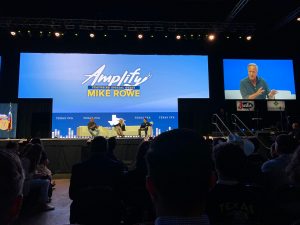
The Texas Future Farmers of America held their annual event this week in Fort Worth and invited me to speak to 15,000 people at The Convention Center. I said sure, and I’m glad I did.
Whatever problems we face as a county, I can assure you the FFA is part of the solution. As I said back in 2009, when I spoke at their national convention in Indianapolis, these are the teenagers you wish you had. Smart, curious, enthusiastic, hardworking, and unfailingly polite. These are the kids who will lead modern agriculture into the next phase. These are the kids who will figure out how to feed a hungry planet.
Before and after my talk, I shook hands with hundreds of these young men and women, and I was struck by the way they all looked me in the eye, smiled, and sincerely thanked me for being there. Obviously, good manners are not unique to the FFA. I noticed the same thing at Skills USA and large Boy Scout events. It’s a common trait among kids who agree to take some kind of a pledge, or oath, or creed.
Well, the FFA has a creed, and their members take it seriously. It was written nearly a hundred years ago by a farmer named E.M. Tiffany. It’s not an academic statement, or a political one. It’s a personal expression of belief. A philosophical statement, that’s been memorized by a lot of people who believe it in their bones.
One of the kids I met today, compared it to my SWEAT Pledge, which I took as a great compliment. He then recited it for me. It’s the first time I’d heard it, and I thought it was worth a share.”
The FFA Creed
“I believe in the future of agriculture, with a faith born not of words but of deeds – achievements won by the present and past generations of agriculturists; in the promise of better days through better ways, even as the better things we now enjoy have come to us from the struggles of former years.
I believe that to live and work on a good farm, or to be engaged in other agricultural pursuits, is pleasant as well as challenging; for I know the joys and discomforts of agricultural life and hold an inborn fondness for those associations which, even in hours of discouragement, I cannot deny.
I believe in leadership from ourselves and respect from others. I believe in my own ability to work efficiently and think clearly, with such knowledge and skill as I can secure, and in the ability of progressive agriculturists to serve our own and the public interest in producing and marketing the product of our toil.
I believe in less dependence on begging and more power in bargaining; in the life abundant and enough honest wealth to help make it so–for others as well as myself; in less need for charity and more of it when needed; in being happy myself and playing square with those whose happiness depends upon me.
I believe that American agriculture can and will hold true to the best traditions of our national life and that I can exert an influence in my home and community which will stand solid for my part in that inspiring task.”
I wish E.M. Tiffany had been backstage with me today, watching as an earnest kid in a blue corduroy jacket recited the words he wrote a hundred years ago, and thanked me for being there.
